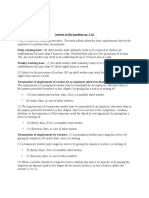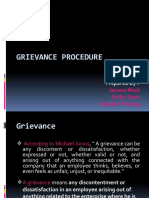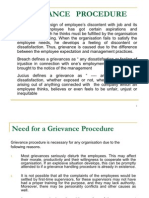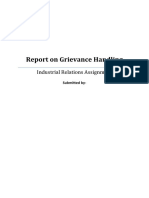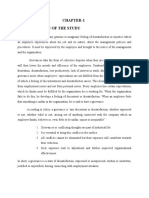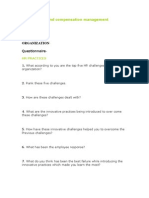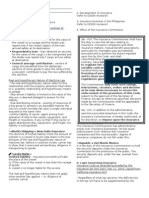0 ratings0% found this document useful (0 votes)
19 viewsHRM Assignment 3
HRM Assignment 3
Uploaded by
NakulGrievances in the workplace can arise due to issues like breaches of employment contracts, lack of promotions or raises, or harassment. Effective grievance management requires acknowledging the complaint, gathering facts, identifying the cause, considering alternative resolutions, and making a timely decision. For example, IT company Wipro developed an integrated grievance management system for insurance customers to register and track complaints online.
Copyright:
© All Rights Reserved
Available Formats
Download as DOCX, PDF, TXT or read online from Scribd
HRM Assignment 3
HRM Assignment 3
Uploaded by
Nakul0 ratings0% found this document useful (0 votes)
19 views3 pagesGrievances in the workplace can arise due to issues like breaches of employment contracts, lack of promotions or raises, or harassment. Effective grievance management requires acknowledging the complaint, gathering facts, identifying the cause, considering alternative resolutions, and making a timely decision. For example, IT company Wipro developed an integrated grievance management system for insurance customers to register and track complaints online.
Original Title
1586180610341_Hrm assignment 3
Copyright
© © All Rights Reserved
Available Formats
DOCX, PDF, TXT or read online from Scribd
Share this document
Did you find this document useful?
Is this content inappropriate?
Grievances in the workplace can arise due to issues like breaches of employment contracts, lack of promotions or raises, or harassment. Effective grievance management requires acknowledging the complaint, gathering facts, identifying the cause, considering alternative resolutions, and making a timely decision. For example, IT company Wipro developed an integrated grievance management system for insurance customers to register and track complaints online.
Copyright:
© All Rights Reserved
Available Formats
Download as DOCX, PDF, TXT or read online from Scribd
Download as docx, pdf, or txt
0 ratings0% found this document useful (0 votes)
19 views3 pagesHRM Assignment 3
HRM Assignment 3
Uploaded by
NakulGrievances in the workplace can arise due to issues like breaches of employment contracts, lack of promotions or raises, or harassment. Effective grievance management requires acknowledging the complaint, gathering facts, identifying the cause, considering alternative resolutions, and making a timely decision. For example, IT company Wipro developed an integrated grievance management system for insurance customers to register and track complaints online.
Copyright:
© All Rights Reserved
Available Formats
Download as DOCX, PDF, TXT or read online from Scribd
Download as docx, pdf, or txt
You are on page 1of 3
Human Resource Management
Assignment - 3
Submitted To: Submitted By:
Mrs. Anushree
Chauhan Shekhar Sehrawat
MBA (II) (A)
19001701063
Q. What is grievance? How it is handled by different
organisation give example.
A grievance is a formal complaint that is raised by an employee towards an
employer within the workplace. There are many reasons as to why a grievance
can be raised, and also many ways to go about dealing with such a scenario.
Reasons for filing a grievance in the workplace can be as a result of, but not
limited to, a breach of the terms and conditions of an employment contract,
raises and promotions, or lack thereof, as well as harassment and employment
discrimination.
The manager should immediately identify all grievances and must take
appropriate steps to eliminate the causes of such grievances so that the
employees remain loyal and committed to their work. Effective grievance
management is an essential part of personnel management. The managers should
adopt the following approach to manage grievance effectively-
1. Quick action- As soon as the grievance arises, it should be identified and
resolved. Training must be given to the managers to effectively and timely
manage a grievance. This will lower the detrimental effects of grievance on
the employees and their performance.
2. Acknowledging grievance- The manager must acknowledge the grievance
put forward by the employee as manifestation of true and real feelings of
the employees. Acknowledgement by the manager implies that the
manager is eager to look into the complaint impartially and without any
bias. This will create a conducive work environment with instances of
grievance reduced.
3. Gathering facts- The managers should gather appropriate and sufficient
facts explaining the grievance’s nature. A record of such facts must be
maintained so that these can be used in later stage of grievance redressal.
4. Examining the causes of grievance- The actual cause of grievance should
be identified. Accordingly remedial actions should be taken to prevent
repetition of the grievance.
5. Decisioning- After identifying the causes of grievance, alternative course of
actions should be thought of to manage the grievance. The effect of each
course of action on the existing and future management policies and
procedure should be analyzed and accordingly decision should be taken by
the manager.
IT major Wipro will develop a system to address the grievances of insurance
customers. Wipro has been selected as an implementing agency for developing
and implementing the integrated grievances management system.
The new system would be an improvement over the existing mechanism as it
would enable policyholders to register and view the status of the grievance filed
with the system.
You might also like
- BEPZA Re-Fixation of Minimum Wages & Benefits 2010Document4 pagesBEPZA Re-Fixation of Minimum Wages & Benefits 2010Mazharul IslamNo ratings yet
- Offer Letter 1367625Document12 pagesOffer Letter 1367625Akhila BanukaNo ratings yet
- Grievance ProcedureDocument11 pagesGrievance ProcedureApeksha TiwariNo ratings yet
- Success In the Payroll Management Business: How to Start Your Own Payroll Management BusinessFrom EverandSuccess In the Payroll Management Business: How to Start Your Own Payroll Management BusinessRating: 2.5 out of 5 stars2.5/5 (2)
- Grievance ProcedureDocument12 pagesGrievance Procedureshubh bhansali100% (1)
- Employee Relation ManagementDocument12 pagesEmployee Relation ManagementMLANISA P.No ratings yet
- Concept of Employee GrievancesDocument71 pagesConcept of Employee Grievancesfatimamehnaz100% (1)
- Handling A GrievanceDocument3 pagesHandling A GrievanceParvathy R NairNo ratings yet
- Grievance Handling-Industrial RelationsDocument4 pagesGrievance Handling-Industrial RelationsArif Mahmud Mukta100% (5)
- Grievance: in An Employee Arising Out of Anything Related To The Enterprise Where He Is WorkingDocument20 pagesGrievance: in An Employee Arising Out of Anything Related To The Enterprise Where He Is Workingmunisha41No ratings yet
- Unit 10 Employee Grievance and Discipline: StructureDocument11 pagesUnit 10 Employee Grievance and Discipline: StructureGiriraj GodaniNo ratings yet
- Grievance Means Any Type of Dissatisfaction or DiscontentmentDocument3 pagesGrievance Means Any Type of Dissatisfaction or DiscontentmentJitendra DasNo ratings yet
- Grievance ProcedureDocument21 pagesGrievance Procedurevijaypalsingh96% (27)
- Employee GrievanceDocument18 pagesEmployee GrievanceEfaf Ali100% (3)
- Grievance HandlingDocument14 pagesGrievance HandlingSaravana KadirvelNo ratings yet
- Legal Issues in Employee RelationsDocument66 pagesLegal Issues in Employee RelationsMj Samonte100% (1)
- Employee Counseling and Grievance HandlingDocument19 pagesEmployee Counseling and Grievance HandlingJunaisah Sharief Maupaat100% (1)
- Grievances Handling: Grievances Resulting From Working ConditionsDocument5 pagesGrievances Handling: Grievances Resulting From Working ConditionsChandra SudhirNo ratings yet
- GrievanceDocument15 pagesGrievanceJasmandeep brar100% (3)
- Topic Importance - Grievance HandlingDocument9 pagesTopic Importance - Grievance HandlingA DASHNo ratings yet
- Concept of Grievance: Grievance Is A Sign of An Employee's Discontent With Job and Its ValueDocument40 pagesConcept of Grievance: Grievance Is A Sign of An Employee's Discontent With Job and Its Valuejyoti_dhomaneNo ratings yet
- Grievance and Discipline PDFDocument20 pagesGrievance and Discipline PDFNagesh100% (1)
- Grievance: Christina Jose MahrmDocument19 pagesGrievance: Christina Jose MahrmChrz JNo ratings yet
- Session 6 Grievance Management and Collective BargainingDocument15 pagesSession 6 Grievance Management and Collective BargainingShreya Binu SathyanNo ratings yet
- 2.3 Employee GreivanceDocument28 pages2.3 Employee GreivanceNickson KamarajNo ratings yet
- GrievanceDocument20 pagesGrievanceMAULIK VadgamaNo ratings yet
- Graviance of WorkerDocument24 pagesGraviance of WorkerJasmandeep brar100% (1)
- Grievance Redress Mechanism GrievanceDocument8 pagesGrievance Redress Mechanism GrievancerdxgudduNo ratings yet
- HRM13-Employee GrievancesDocument6 pagesHRM13-Employee GrievancesAnnalene BantilanNo ratings yet
- Grievance Step LadderDocument23 pagesGrievance Step LadderKishan PatelNo ratings yet
- HRM 404 FinalDocument5 pagesHRM 404 FinalAnjobi AktetNo ratings yet
- Assignment Cover: Module: Human Resources ManagementDocument4 pagesAssignment Cover: Module: Human Resources ManagementWellington ChariNo ratings yet
- Unit-V Employee GrievancesDocument38 pagesUnit-V Employee GrievancesramamohanvspNo ratings yet
- Grievance ProcedureDocument11 pagesGrievance Procedurejayanamodi04No ratings yet
- Human RelationsDocument29 pagesHuman RelationsVaibhav KannavNo ratings yet
- Grievance Redressal & Disciplinary PolicyDocument5 pagesGrievance Redressal & Disciplinary PolicyPraveen ShankerNo ratings yet
- Topic 7 - Grievance, Discipline and Redundancy Procedures Tutorial Solutions Shivani Swastika Lal - 2007004229Document5 pagesTopic 7 - Grievance, Discipline and Redundancy Procedures Tutorial Solutions Shivani Swastika Lal - 2007004229Shivani Swastika LalNo ratings yet
- Grievance ProcedureDocument21 pagesGrievance ProcedureMuthu KumaranNo ratings yet
- Desirable Features of A Grievance ProcedureDocument4 pagesDesirable Features of A Grievance Proceduresubbu2raj3372100% (2)
- Ohsc Assignment 7Document6 pagesOhsc Assignment 7Kumar Mangalam100% (1)
- Grievance Handling MachineryDocument16 pagesGrievance Handling MachinerySHWETA SAXENANo ratings yet
- GgsDocument1 pageGgsAkuros GamingNo ratings yet
- Grievance HandlingDocument21 pagesGrievance Handlingvarunchoudhary275No ratings yet
- Grievance ProcedureDocument21 pagesGrievance ProcedurePriyanka_Bagdi_1938No ratings yet
- Grievance RedressalDocument42 pagesGrievance Redressalishmeet sachdevaNo ratings yet
- Grievances and Discipline HandlingDocument5 pagesGrievances and Discipline HandlingPriya Tiku KoulNo ratings yet
- Grievance in IndustryDocument14 pagesGrievance in IndustryKrishna PriyaNo ratings yet
- Chapter 6 SEU IndustrialDocument14 pagesChapter 6 SEU Industrialsz hridoyNo ratings yet
- Report On Grievance Handling: Industrial Relations AssignmentDocument9 pagesReport On Grievance Handling: Industrial Relations Assignmentinom18No ratings yet
- ALL01Document109 pagesALL01Krishna RajNo ratings yet
- A Study On Grievances HandlingDocument19 pagesA Study On Grievances HandlinglooserNo ratings yet
- Grievance HandlingDocument72 pagesGrievance HandlingShreyas Shivananjappa50% (4)
- Unit 22 Grievance Handling and Discipline: ObjectivesDocument13 pagesUnit 22 Grievance Handling and Discipline: ObjectivesLester HerculesNo ratings yet
- Imc4 4Document16 pagesImc4 4amit kumar shuklaNo ratings yet
- 11262N - Ch13 - Employee Grievances PDFDocument6 pages11262N - Ch13 - Employee Grievances PDFBeboy TorregosaNo ratings yet
- Complaints to Cheers, Feedback to Gold: Mastering Complaints ManagementFrom EverandComplaints to Cheers, Feedback to Gold: Mastering Complaints ManagementRating: 1 out of 5 stars1/5 (1)
- Textbook of Urgent Care Management: Chapter 13, Financial ManagementFrom EverandTextbook of Urgent Care Management: Chapter 13, Financial ManagementNo ratings yet
- 7 Easy Steps to Conduct a Human Resources Audit and Protect Your Company!From Everand7 Easy Steps to Conduct a Human Resources Audit and Protect Your Company!Rating: 5 out of 5 stars5/5 (1)
- Assignment - 1 Strategic Management: Submitted ToDocument14 pagesAssignment - 1 Strategic Management: Submitted ToNakulNo ratings yet
- Strategic Management Assignment NakulDocument9 pagesStrategic Management Assignment NakulNakulNo ratings yet
- BR REflection Naku LDocument1 pageBR REflection Naku LNakulNo ratings yet
- Experiment - 1 Aim: Steps To Apply Formatting in Ms Word and Use of Format Painter Tab Steps To Apply FormattingDocument3 pagesExperiment - 1 Aim: Steps To Apply Formatting in Ms Word and Use of Format Painter Tab Steps To Apply FormattingNakulNo ratings yet
- Common Admission Test 2018 Admit Card: Name Registration NumberDocument1 pageCommon Admission Test 2018 Admit Card: Name Registration NumberNakulNo ratings yet
- Revised Key Dates Final Information Brochure JC BOSE 2019 09-05-2019Document1 pageRevised Key Dates Final Information Brochure JC BOSE 2019 09-05-2019NakulNo ratings yet
- Entrance Examination Dates & Time For M.SC., MBA & Mca CoursesDocument1 pageEntrance Examination Dates & Time For M.SC., MBA & Mca CoursesNakulNo ratings yet
- Compensation and HR Practices - QuestionnaireDocument3 pagesCompensation and HR Practices - QuestionnaireVinnu Gaadu0% (1)
- Entrepreneur - 2024 Ben Angel AI - White PaperDocument13 pagesEntrepreneur - 2024 Ben Angel AI - White Paper8ftp4bhykbNo ratings yet
- Strategic Management Seminar PresentationDocument6 pagesStrategic Management Seminar PresentationFady EhabNo ratings yet
- Vol. I - Tender and Conditions of ContractDocument74 pagesVol. I - Tender and Conditions of ContractAhmed Shalaby100% (1)
- CXL ReplicationDocument9 pagesCXL ReplicationThanash KumarNo ratings yet
- Sample Appropriation OrdinanceDocument2 pagesSample Appropriation OrdinanceMaria Fiona Duran MerquitaNo ratings yet
- Digest Philippine Blooming Mills Employees Organization vs. Philippine Blooming MillsDocument3 pagesDigest Philippine Blooming Mills Employees Organization vs. Philippine Blooming MillsJet AviNo ratings yet
- 115-Article Text-394-1-10-20191020 PDFDocument11 pages115-Article Text-394-1-10-20191020 PDFDumitrita MunteanuNo ratings yet
- Essay by InfinitesimalDocument58 pagesEssay by InfinitesimalSamuel BeckettNo ratings yet
- Training DevelopmentDocument74 pagesTraining Developmentvamsibu100% (1)
- Ma 1Document2 pagesMa 1Jade Ballado-TanNo ratings yet
- Ability TestDocument8 pagesAbility TestblmadhukumarNo ratings yet
- Unconscious Bias Training That WorksDocument5 pagesUnconscious Bias Training That Worksjosefien.klaseboerNo ratings yet
- Ohsc Assignment Coversheet 4Document7 pagesOhsc Assignment Coversheet 4Rabi AdhikaryNo ratings yet
- Reducing Waste and Errors: Piloting Lean Principles at IHCDocument22 pagesReducing Waste and Errors: Piloting Lean Principles at IHCRuby SharmaNo ratings yet
- HR Assignment 1 Nurhidayah Abdul JalilDocument10 pagesHR Assignment 1 Nurhidayah Abdul Jalildayahjalil44No ratings yet
- StaffingDocument26 pagesStaffingMoses KibetNo ratings yet
- Funa V Civil Service CommissionDocument2 pagesFuna V Civil Service CommissionMarga Lera67% (3)
- Industrial Dispute Act MCQDocument7 pagesIndustrial Dispute Act MCQAarti Parewa100% (3)
- INSURANCE - ReviewerDocument43 pagesINSURANCE - ReviewerRC Boehler86% (7)
- Non Compete ClauseDocument3 pagesNon Compete ClauseWhere Did Macky GallegoNo ratings yet
- Effects of Incentives On Employees ProductivityDocument8 pagesEffects of Incentives On Employees ProductivityInternational Journal of Business Marketing and Management100% (1)
- K 23 LatestDocument32 pagesK 23 Latest3 B 440 YuvankarthikeyanNo ratings yet
- Strategic Human Resource ManagementDocument8 pagesStrategic Human Resource Managementthamilarasu100% (2)
- HU Tools Student HandoutDocument15 pagesHU Tools Student HandoutDbaltNo ratings yet
- Human Resources Management (Graduate Certificate)Document1 pageHuman Resources Management (Graduate Certificate)faforesamuel17No ratings yet
- Strategic & HR Planning: Ifada - Rahmayanti@mm - Uad.ac - IdDocument9 pagesStrategic & HR Planning: Ifada - Rahmayanti@mm - Uad.ac - Idkeuangan pku muhammadiyah petanahanNo ratings yet
- Simon大作文Task2范文整理Document43 pagesSimon大作文Task2范文整理Lilac EratoNo ratings yet






























